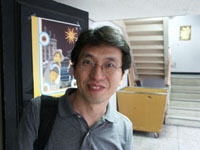|
Yoshimi Shunya
is Professor of Interfaculty Initiative in Information Studies, University of Tokyo. Born in Tokyo, April 22, 1957. Graduated University of Tokyo (Department of Liberal Arts) and the Graduate School of University of Tokyo (Sociology).
Also visiting fellow of El Colegio de Mexico (1993), Ecole des Hautes Etudes Sciences Sociales (1998), University of Western Sydney (1999), Queensland University (2000). Basically working on cultural studies and cultural history on
the popular culture in modern Japan. Especially on National Event, Urban Culture, Exhibition, Theme Park, Department Store, Americanization, Technology in Everyday Life etc. Book publications are: Dramaturgy in the City: the Social History of Popular Entertainments in Modern Tokyo,
Koubundo, Tokyo, 1987, The Politics of the Exposition: Imperialism, Commercialism and Popular Entertainment,
Chuoukouronsha, Tokyo, 1992, Cultural Sociology in the Media Age,
Shinyousha, Tokyo, 1994, Capitalism and the Voice: the Social Construction of Telephone, Gramophone and Radio in Japan,
Koudansha, Tokyo, 1995, Realities in Transit, Kinokuniya Shoten, Tokyo, 1996, Dialogue with Cultural Studies, (Collaboration with Tasturo Hanada and
oters), Shinyosha, Tokyo, 1998, Cultural Studies, Iwanami Shoten, Tokyo, 1999, Perspectives on Globalization, (Collaboration with Kang Sang Jun), Iwanami
Shoten, Tokyo, 2000, Media and the Body in 1930s Japan (editing book),
Seikyusha, Tokyo, 2002, Cultural Turn, for the politics of cultures, Jinbun
Shoin, Kyoto, 2003, Introduction to Media Cultural Studies, Yuhikaku, Tokyo, 2004, Expo Syndrome: Postwar Politics and Cultural Struggle in Contemporary Japan, Chikuma
Shobo, Tokyo, 2005, Tokyo Studies, a new critical
guidebook for Tokyo, Kinokuniya Shoten, Tokyo, 2005, etc.
|

